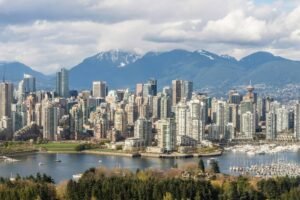
Canada’s announcement on Friday of a moratorium on oil-tanker traffic along the north coast of British Columbia appears to signal a crucial element of Prime Minister Justin Trudeau’s game plan, namely the procurement of a positive future for Canada and all generations to come.
Regardless of whether or not one supports the drill-baby-drill mindset, or the grow-the-economy-at-all-costs ideology, one has to acknowledge that an oil spill of any significance on the rugged storm-lashed west coast of Canada would spell disaster for hundreds or even thousands of years. So, to Mr. Trudeau and his cabinet, we say a heartfelt thank you. Thank you for defending our magnificent coast, for protecting the abundant wildlife, and for safeguarding the traditional lands of the First Nations people who have lived in this pristine temperate rainforest region for many thousands of years.
The decision to ban oil-tanker traffic effectively puts an end to the Northern Gateway pipeline that was already approved by the National Energy Board, albeit it through a demonstrably flawed process. The oil pipeline was intended to transport diluted bitumen from Alberta’s oil tar sands to Kitimat for shipment to Asian markets. The ruling is undoubtedly bad news for both the oil company, Enbridge, and the government of Alberta, but at some point all corporations and governments simply have to acknowledge that our planet is heading for imminent disaster, and that we cannot continue on the path of infinite development in this finite world of ours.
The new Canadian government appears to recognize that we have now reached or passed that point. If we set aside the new-broom-sweeps-clean skepticism, and this new sense of responsibility is indeed well intentioned and here to stay, then Canada is back in good hands. Hopefully this is a positive sign of Mr. Trudeau’s philosophy and his approach to the correction of Canada’s past inaction on climate change and green-house gas emissions.
Governments and big business are driven by insatiable greed and the desire for immediate gain and reward, with little or no consideration for the future of our ailing planet or the dreadful prospects in store for our children, our grandchildren, and the thousands of future generations destined to eke out an existence on this planet – in whatever state we leave it in.

Capital investment in alternative energy now exceeds capital investment in the natural resource extraction industry, so the need for change is already well established and underway. The world is turning to sustainable and alternative sources of clean renewable energy, and the sustainable energy sector is now rapidly expanding at the expense of the old ways. Resistance is futile, and potentially costly. The rejection of the Keystone XL oil pipeline by the Obama administration this month is another example of this change, and it saddled TransCanada Corporation with a reported $7 billion in costs already incurred, as they had unwisely powered ahead without first securing approval for their always-controversial project.
The oil and natural-gas companies worldwide must concede that their respective industries will slowly wind down over time as the oil glut continues, the demand drops, and the LNG-production frenzy grows and eventually implodes under the devastating environmental consequences that are already visible for all to feel and taste (earthquakes and tainted water). Corporations need to recognize this inconvenient truth and abandon current or proposed projects that have been or will be nixed by responsible and environmentally-aware governments. It is said that necessity is the mother of invention, so the energy industry needs to be proactive and ramp up their inventions if they are to evolve their industry fast enough to remain valuable players in the energy-supply business.
The 2015 United Nations Climate Change Conference (COP 21) in Paris from November 30th to December 11th aims to achieve a legally binding and universal agreement on climate from all nations of the world. COP 21 will hopefully see all nations finally push back against the significant pressure and lobbying from a corporate world intent on raping and pillaging our planet until all natural resources are exhausted and the warmed oceans are dead from over fishing, pollution, plastics, oil spills, industrial waste and agriculture runoff.
The world waits with bated breath for meaningful progress and action at COP 21, and this time there appears to be genuine confidence that the old, tired head-in-the-sand rhetoric won’t cut it anymore, and that real change must be hammered out and agreed upon. Canadians appear to have renewed hope that Justin Trudeau and his non-partisan team will demonstrate that Canada’s denial and obstructive past are well and truly over, and that we intend to step up, face our responsibilities and obligations, and make a meaningful contribution to the urgent need for the world to address the many factors affecting the change in climate that we are already experiencing with such disastrous results.
We are all responsible for our own little corner of the world, so let’s hope that the outrageous plan to build the Site C Dam on the Peace River is quashed next, along with a ban or moratorium on hydraulic fracturing (fracking) in Northern British Columbia. Only then can our corner of the world commence healing itself, and only then will Mother Earth be somewhat pleased with us.
Photo Caption:
Featured Image: The Inside Passage on the remote and rugged coast of Northern British Columbia. Try to imagine the impact of an oil spill here … in rough winter weather!






